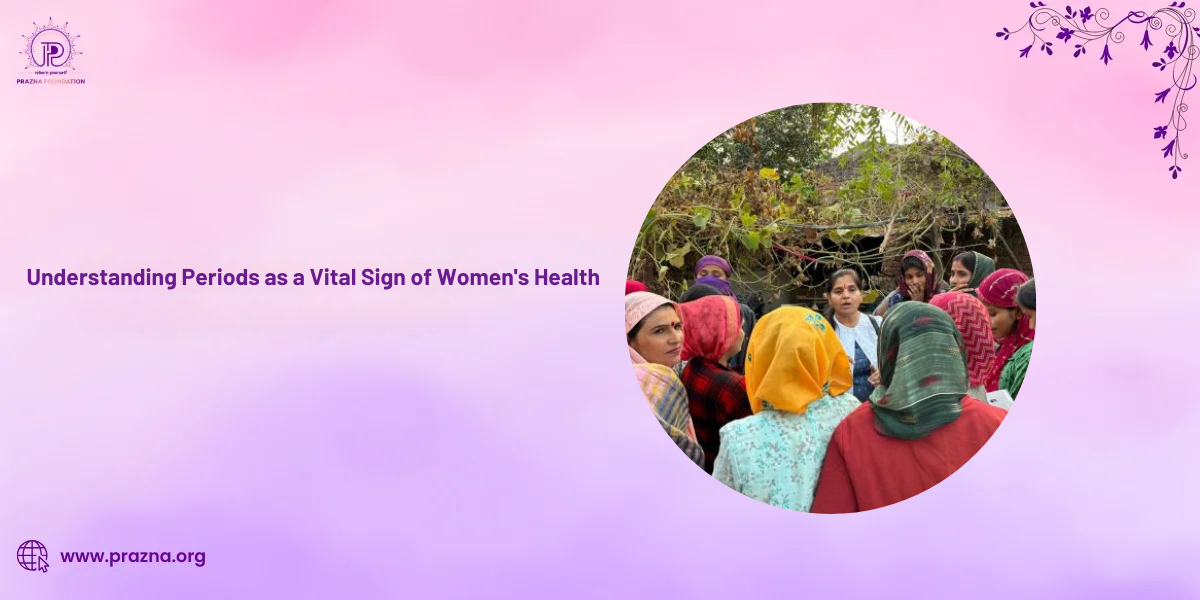Introduction
Period is a biological process that you get once a month’s, it’s a major life event. There should be far more conversations acknowledging that the onset of a new menstrual cycle could bring forth dramatic changes in one’s hormonal levels, emotions, and even physical well-being. This ordinary occurrence is still perceived to be a shame-hitter, thereby shading elders and the different social groups with an uncomfortable feeling.
This is where awareness programs, such as a Women’s Healthcare NGO, can go a long way to creating knowledge and early care.
Understanding the Emotional Side of Your Cycle
A Simple Check on Your Health
Regular periods and pain-free periods normally show the good functioning of hormones and the body system. But a cycle that is irregular or too frequent or very painful and having any other concerning symptoms, can show serious problems like thyroid malfunction (including thyroid problems, PCOS, stress), doctors mostly. Think of your menstrual cycle as a vital health parameter, much like one’s heartbeat or body temperature. Your menstrual cycle is an early warning light on your reproductive and hormonal health. If it’s identified early, then you can go for early diagnosis and treatment that will make you get better very soon.
Break the Blood Taboo
Even in this very 21st century, thousands of girls and women cannot communicate well with their elders. They are not comfortable describing signs or asking for assistance if something feels wrong, thereby taking the risk of worsening conditions, misinformation, and emotional turmoil. We should start to talk about periods at home, in schools, and at work to reduce the fear and build confidence. Open dialogue enables women to feel seen, supported and empowered so they can make their health a priority.
Read your cycle red flags
A few shifts in your bedtime may be symptoms that your body requires medical care. For example:
- Periods that cease abruptly for months
- Extremely heavy bleeding
- Discomfort disrupts the normal course of activity or occupation.
- Spotting between periods
- Image Periods that ooze on for over a week
Because they are so uncomfortable to feel, and may indicate more serious issues in your body. If they are not properly treated, they could have turned into something more serious that would have been easy to avoid had you sought the help early.
Psychological Aspect of This Cycle
Hormonal changes throughout the menstrual cycle have an effect that is not limited to the body. There are many times in a month when you may feel more sensitive, irritated or anxious. Normal moodiness is ok, but extreme problems show some psychological needs, and one should go to the doctor for some mental health support.
Acknowledging this emotional connection can help women and the people around them foster an environment of support, which can mean less guilt or shame around mood changes and improved women’s menstrual health practices overall.
Give Your Cycle a Little Care
You don’t need to make big lifestyle changes to promote your menstrual health. Even modest changes can create profound results:
- Moderate exercises may prove beneficial for you during your menstrual flow, so you can remain basic.
- Keeping a regular record of your body cycle puts you in a position to detect any unusual changes early on.
- Foods with iron, calcium, and fibre must be taken into the diet.
- Water has to be consumed on a large scale after making healthy choices that reduce stress.
- If your symptoms are so rare that they become an anomaly, then consult a doctor.
- Quality health care at all times assures a gentle and healthy menstruation experience.
Community Support
The girl should feel strong and informed about her periods with the right information and help. This will help her be aware of her cycle and maintain her health accordingly. Local programs and group activities set the stage for her to learn and share her experiences safely. Women lifting each other and women talking about it dissolve shame and generate confidence.
Groups like a Women’s Empowerment NGO are working to do that by giving resources, counselling, and access to care to those who need it most.
Conclusion
It’s not just a biological process, your menstrual cycle is also a physical indicator of health each month. By paying attention to its flow, length, pain level, and emotional toll, you can learn to recognize the warning signs of health problems – and spare yourself some serious grief in the process. The fact is that the more you understand what your period can tell you about your personal well-being, physical and emotional, the better your life will be. Let’s do our best to push women toward setting a priority on menstruation. So, it was never to be hidden behind a cloister, disregarded, or given the least importance.
When we start talking about it, seek help when required, we shall begin to change the syllables connected to menstrual health from stigma to strength.
FAQs
- What if the period stopped or there were never any periods?
Well, reasons could include stress, hormonal changes, or an actual medical condition.
- Is it common to feel very strange with mood changes just before menses?
Yes, it would be a sign of emotional changes, but the strength of such changes may indicate something else medical attention.
- How can I acquire updated information about menstrual health?
Women’s menstrual awareness program is a great way to go, not to mention that you can also speak to a health expert.
Also check : How Menstrual Health Affects Mental Health









